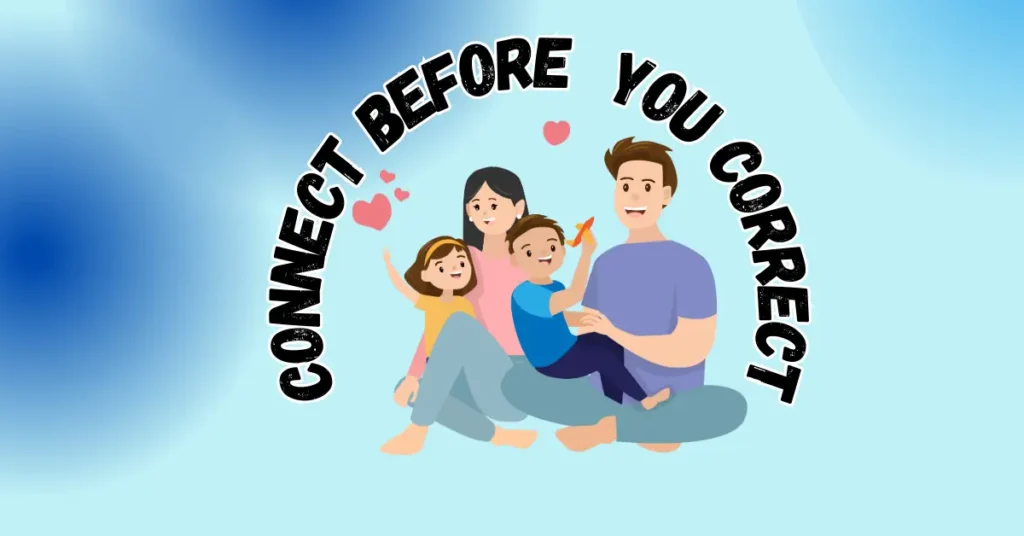
Is “Connect Before You Correct “Truly Effective or Just a Popular Parenting Trend?
When I became a mum, I believed I understood my responsibilities. I thought the connection with my kids would become natural without any effort; it was only my responsibility to teach my children to be responsible and well-behaved people but neglecting their emotions.
Am I a bad mother? I don’t know, but I wish I had focused more on connection than correction.
I thought discipline involved following rules and having a plan. The connection was unnecessary, and I regret the time I missed with my kids.
Is Connecting Before Correcting the Key to Parenting, or Just a Trendy Slogan?
Why Connection Matters Before Correction?
As adults, we hate someone who tells us our fault in a criticizing manner or criticizes us.
When adults are overburdened or irritated, what calms them? We can feel better if we get someone who can support us and pay attention to our feelings without judgment. It’s not about getting corrected for our errors or even if they come up later in the conversation; it’s about understanding us. Children also have the exact needs. They need to feel connected to us before they can appreciate whatever lesson we are trying to give.
Studies find that children who feel connected and safe are more likely to be receptive and helpful. Their brains are more open to learning when not in fight-or-flight mode, which can happen if they feel scolded or misunderstood (Dr. Daniel Siegel’s “The Whole-Brain Child”)
Here is a real-life example :
You remind the 10-year-old to do his assignments before bed. Later that evening, you check back to see how he is doing and discover he has not touched anything and is already asleep in bed. You are annoyed, let down, and possibly even slightly hostile. You don’t know why he didn’t do his homework.
- First option: You might wake him up and tell him to be ready to do the homework
- Second Option: You could let him sleep or wait until morning to find out why he skipped the homework.
Which choice would your heart guide you towards?
Let’s assume you choose the first option. You march into your child’s room, feeling upset, and wake him up, telling him to finish his homework right now. But as he wakes up, you notice something isn’t right. His little face is pale, his skin feels hot, and he starts to cry instead of just being sleepy or grumpy. That’s when it hits you—he’s not ignoring you; he’s sick.
Your heart sinks, and you feel a wave of regret. If you had taken a moment to connect with him first, you might have noticed he wasn’t feeling well. Instead, your rush to correct him brought unnecessary stress to both of you.
It’s our responsibility as parents to build connections with our kids” ( so connect before we connect is the best approach). In a study by Dr. Laura Markham, a clinical psychologist specializing in parenting, she found that when parents lead with connection, children are more likely to develop emotional self-regulation and empathy. This approach fosters long-term cooperation and trust, as children who feel heard and valued are less likely to act out and more inclined to follow guidance (“Peaceful Parent, Happy Kids”).
What I wish every new parent would know
- Your kids will sometimes mess up and need your guidance, but they first need you to understand their feelings. Take a moment to understand how your child feels, and then guide them in a supportive rather than judgmental way. Connecting first makes correcting things a lot easier.
- Your child’s feelings are significant, even more than any mistakes they make. When your child feels understood, they’re much more likely to be open to learning and working together.
- When you focus on connection, you’ll notice that your child feels more secure, and the lessons you’re trying to teach will resonate with them on a deeper, more meaningful level.
Related :
- How to Help Your Shy Child Thrive: Expert Advice from Psychologists,
- Why You Shouldn’t Tell Your Kids To “Stop Crying” And What To Say Instead,
- How Can I Get My Kids to Listen Without Yelling?
- How to Help Kids Understand and Manage Their Emotions
References :
- Dr. Daniel Siegel’s “The Whole-Brain Child”:
- Siegel, D. J., & Bryson, T. P. (2011). The Whole-Brain Child: 12 Revolutionary Strategies to Nurture Your Child’s Developing Mind. Delacorte Press.
- Dr. Laura Markham’s “Peaceful Parent, Happy Kids”:
- Markham, L. (2012). Peaceful Parent, Happy Kids: How to Stop Yelling and Start Connecting. Perigee Books.



